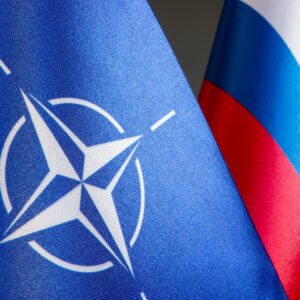For an alternate viewpoint, see “Point: A Second Chance for NATO Expansion.”
God grant me the serenity to accept the things I cannot change, courage to change the things I can, and the wisdom to know the difference. — Reinhold Niebuhr’s “Serenity Prayer,” 1943
Harry Truman understood Reinhold Niebuhr’s “Serenity Prayer.” Because of this, NATO’s founder would surely resist NATO expansion. In 1947, Truman was confronted with what is to us a familiar challenge: Soviet (Russian) aggression. Breaking wartime accords, the Soviets occupied Eastern Europe and schemed to overtake the Western half. This was a strategic challenge of the highest order, which seemingly posed a binary choice: appeasement or war.
Recalling Neville Chamberlain, Truman refused appeasement. He also realized a bloody war to roll back Soviet aggression did not serve the national interest. But Truman knew his Niebuhr. Made famous by 12-step programs, Niebuhr originally penned his plea for war-weary Americans. But the philosopher-theologian’s prayer came to encapsulate early Cold War philosophy to counter Soviet aggression while avoiding full-fledged war.
Rejecting both combat and concession, Truman’s middle way was the 12-nation North Atlantic Treaty Organization. A collective security pact, NATO was the foundation of America’s postwar containment policy. Via NATO, the West contained Soviet expansion until it would collapse from “internal contradictions.” Hardly the stuff of action movies, NATO and containment were stolid, sober and serious answers to Soviet imperialism. It also worked. Despite strategic blunders and inter-alliance tensions, NATO held firm and the Soviet Union crumbled from within.
Seventy-five years later, the West is confronted with a reprise of Russian imperialism. Like our forbearers, there are those so filled with understandable umbrage and outrage that they seek an aggressive, affirmative response: NATO expansion. In the heat of the moment, we must keep our heads and remember Niebuhr and Truman’s sage example. Both understood that America had to restrain its inner-Yosemite Sam and thread a political needle by countering aggression without spiraling into an atomic conflagration. NATO expansion into Georgia, Moldova, Ukraine and even Finland are needlessly provocative measures, which could also undermine the alliance.
NATO’s current united stand against Russian aggression resulted from decades of slow-gestating security, economic, political and cultural integration. In theory, NATO is open to those nations that meet certain economic and political criteria and contribute to Euro-Atlantic security. Georgia, Moldova and Ukraine simply do not meet those standards. In addition to lagging economic development, all three bring with them pre-existing conflicts, which could drag the alliance into war.
Realists have bemoaned NATO expansion into Poland (1999) and the Baltics (2004) for sparking Russia’s ire and the present conflict. These specialists are, to some extent, correct. But their analysis misses the point. First, Poland and the Baltic states are sovereign nations equipped to make security considerations that run counter to Russian desires. Moreover, Russia did not heatedly object, which meant expansion did not bring with it an imminent threat of war. But 2022 is not the late 1990s and early 2000s. Today, adding Georgia, Moldova, Ukraine and even Finland invites further conflict with a humiliated and nuclear-armed Russia. This is no time for provocations on Russian borders.
NATO is only as strong as its members’ commitment to Article V. The Three Musketeers proviso pledges each member state to consider an attack on one as an attack on all. It is wholly foreseeable that a NATO state could deem a conflict with Russia over far-flung Moldova, for instance, as outside its security interests and refuse to invoke Article V. Such a scenario could be the alliance’s undoing and Putin’s ultimate fantasy.
Niebuhr and Truman would not deem Russian domination of its neighbors as something the West cannot change. But they would caution that our seething rage at Putin’s war should not blinker our wisdom so that we blunder into a catastrophic, wider conflict. Courage oft-times calls for discretion and measured responses. Arming the Ukrainians, sanctioning Russia and offering robust security assistance short of NATO enlargement has helped stymie Putin’s advance. To be sure, such measures do not result in emotional satisfaction. But this is not a Hollywood movie. Americans should not expect a tidy denouement in which the plot is resolved after a climatic end.
A wise Niebuhrian and Truman-esque response is one that salvages Ukrainian sovereignty, severely punishes Russia, forestalls a wider war, and prevents future conflict. Be prepared. There is no quick and easy solution to this foreign policy crisis. The West must accept it cannot end Putin’s aggression in one fell swoop. It is a challenge that must be managed, confronted and thwarted. This is no time for dramatic gestures. Truman’s example and Niebuhr’s “Serenity Prayer” point the way.

